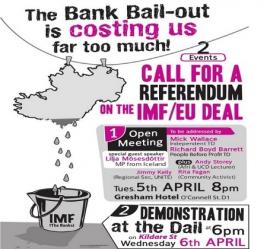Over 30 years of anarchist writing from Ireland listed under hundreds of topics
Fighting the ‘Bailout’ – why a referendum is not the answer
 Approximately 300 people attended a meeting in the Gresham Hotel in early April which “endorsed the formation of a campaign, called "Enough!" to resist the IMF EU deal and to demand a referendum.”[i] At first thought it seems to be a campaign which should be enthusiastically supported by anarchists and libertarians. After all we’re always going on about grassroots democracy and about involving people in decisions about things that affect them. And didn’t the people of Iceland have not one but two referenda on their ‘bailout’ in the last 13 months? If they can have two, why shouldn’t we have at least one!
Approximately 300 people attended a meeting in the Gresham Hotel in early April which “endorsed the formation of a campaign, called "Enough!" to resist the IMF EU deal and to demand a referendum.”[i] At first thought it seems to be a campaign which should be enthusiastically supported by anarchists and libertarians. After all we’re always going on about grassroots democracy and about involving people in decisions about things that affect them. And didn’t the people of Iceland have not one but two referenda on their ‘bailout’ in the last 13 months? If they can have two, why shouldn’t we have at least one!
There seems to me to be a bit of a problem though. The raising of a call for a referendum at this time appears to a case of putting the cart before the horse. What seems to be forgotten is that the Icelandic referendum in 2010 came after a huge mobilisation of the country’s population in opposition to attempts by the government to place the cost of the banking crisis on the shoulders of ordinary citizens.
Power
Thus when the referendum came about, a huge debate had already taken place among the country’s population. And, more importantly, the people had gained a glimpse of their potential power through the mass mobilisations which had taken place.
To raise a call for a referendum in the current Irish circumstances could actually be quite dangerous. It gives the impression that all that is needed to oppose the bailout is that we vote against it. And then won’t the Irish government, the ECB and the IMF respect the democratic wishes of the Irish people?!!
But we all know – including at least some of those that are backing the call for a referendum – that democracy doesn’t work like that. After all during the recent election campaign Enda Kenny and Eamon Gilmore both on several occasions described the election as a referendum on the previous government’s policies. Having won the election they then proceeded to ignore the results of that ‘referendum’ and continued to implement the policies of the old government.
Indeed in the Dáil debate on the United Left Alliance’s private members motion calling for a bailout referendum, Fianna Fáil’s Éamon Ó Cuív summed up the attitude of the political establishment to ‘democracy’
“With a referendum the people normally get a choice and the people’s will is implemented. In this case there was a choice but the current Government realised that what was put to the Irish people was not exactly the best choice; I am thankful an about turn was implemented”[ii]
People Power
Having a referendum in current circumstances could actually turn out to be quite disempowering. In Ireland we have all singularly failed thus far to build any level of ‘people power’. There simply isn’t any experience of people having the power to effect change. In such circumstances, a referendum could prove to be a passive rather than an active experience.
If opposition to the ‘bailout’ is to be built, it must be done in the context of challenging the social relations on which the current economic system is built. What is needed - and so far it’s proven elusive – is to build a coalition of people power that will challenge the very system, capitalism, on which that system rests. And not alone must the capitalist system be challenged but we must as a class actively participate in tearing down the current economic system and replacing it with a system based on people’s needs rather than the greed of a few.
That’s not something that can be done by a referendum, instead it involves challenging working class people through our unions and community groups to get stuck in and begin to take an active part in the necessary discussion about what type of society we want to live in – and how we’re going to build that society.
[i] As reported on the Socialist Workers Party website, www.swp.ie

